Can a child who starts kindergarten with few reading or math skills catch up?
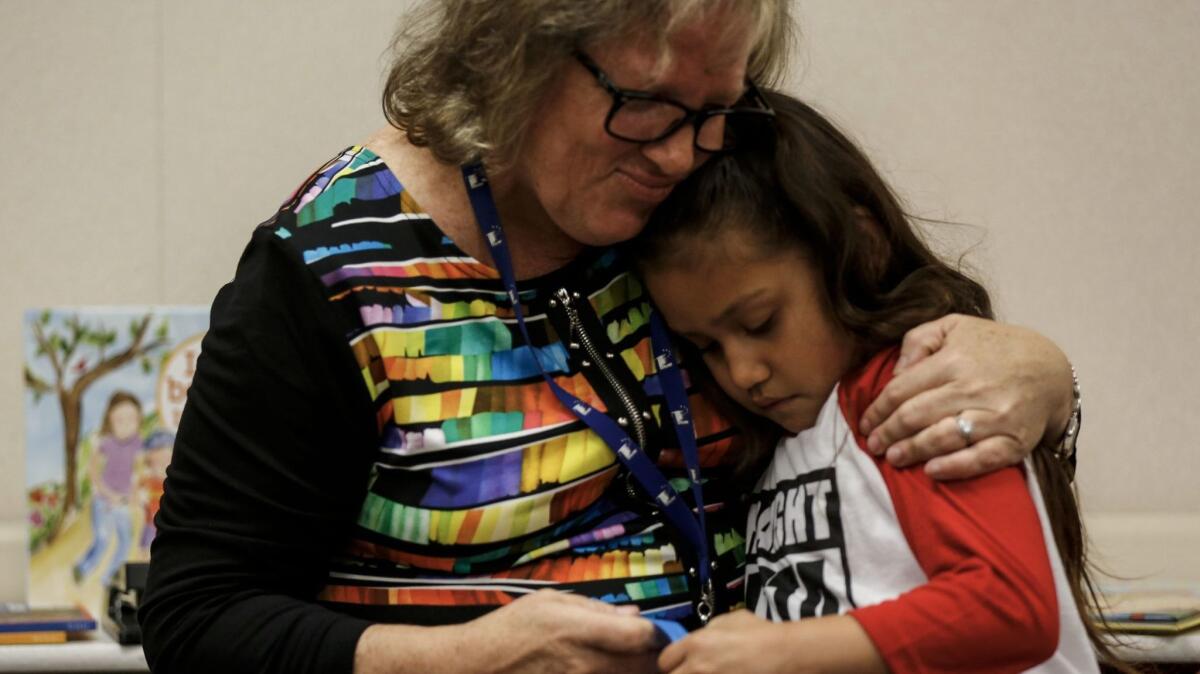
- Share via
Giuliana Tapia was way behind her classmates.
She was just 5 years old, starting kindergarten at Telesis Academy of Science and Math in West Covina.
At a kindergarten screening two months before her first day, she happily chattered about her dog Toodles, her favorite color pink, her Santa Claus pajamas, her nickname Gigi, her outings with dad to see SpongeBob SquarePants movies.
But many of her 21 classmates already knew most of the alphabet, colors and shapes. Two of them could even read all 100 words — at, the, there, like — that kindergartners are expected to know by the end of the year.
About half had been to preschool; Giuliana had not.
“I don’t know,” she said when she was asked to identify letters on a sheet of paper.
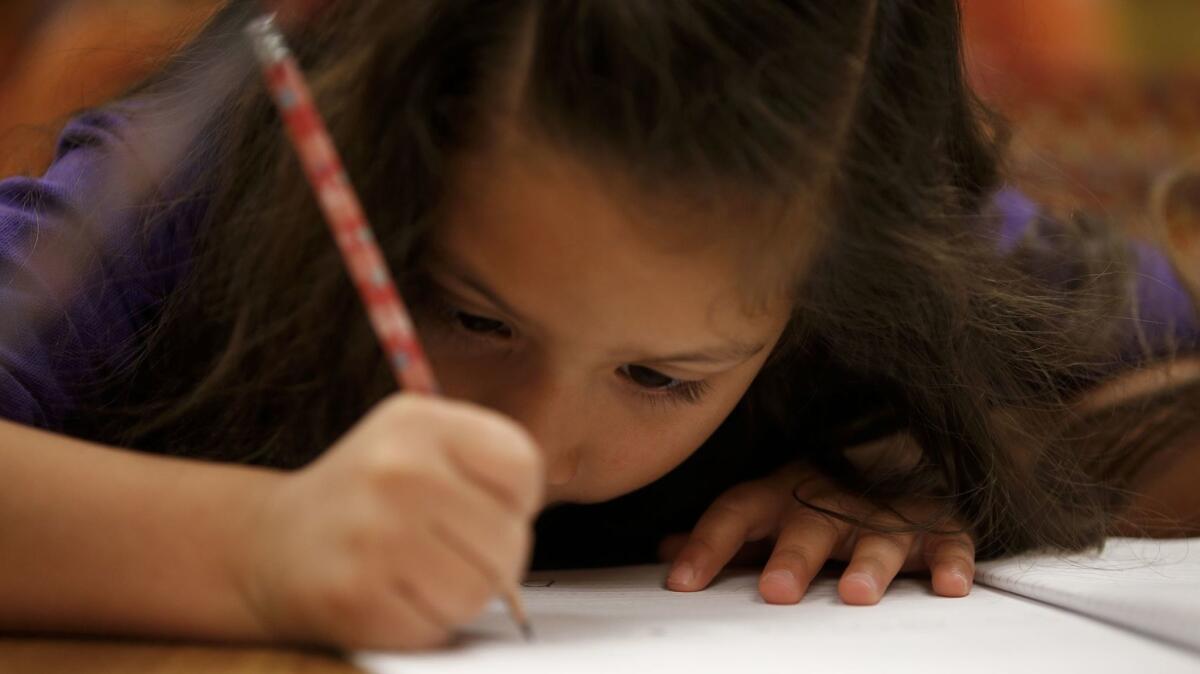
Then, anxiously, “But that’s OK, right?”
Giuliana is not atypical of Latino children, who have the lowest rates of preschool attendance among all racial and ethnic groups. A 2015 UC Berkeley study of 4,550 children nationwide found that although Latino children showed roughly the same level of language comprehension as their white peers at 9 months old, four-fifths had fallen up to 5 months behind by the time they were 2.
The study found that only 28% of the Mexican American mothers who spoke English at home, as Giuliana’s mother does, read to their children daily, compared with 59% of white mothers.
No preschool. No daily stories read out loud. Could Giuliana catch up?
***
Giuliana is the firstborn child of Arturo and Anna Tapia, who have showered her with love and family time — outings to beaches and mountains, Disneyland and SeaWorld, movies and the zoo. And they worked to develop her social and verbal skills, eschewing baby talk.
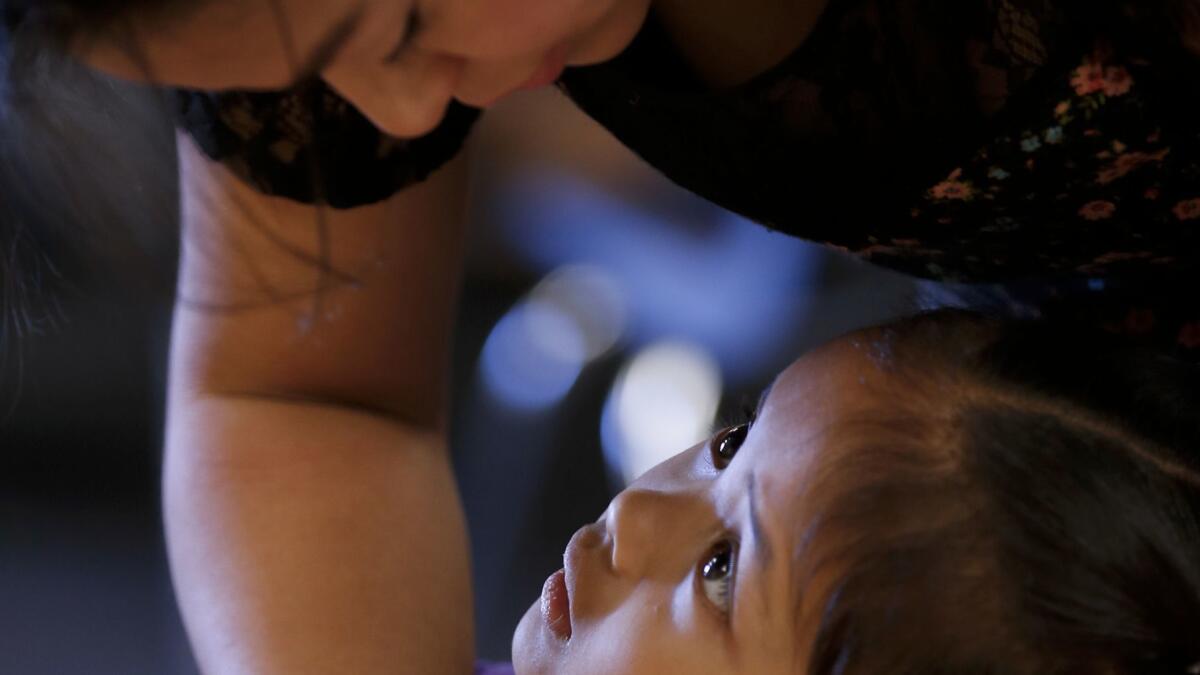
But the Tapias did not read to her at home, take her to the library or teach her the alphabet. A relative who teaches kindergarten had urged preschool for Giuliana, but the Tapias were protective. “We thought she was going to stay little forever,” Arturo Tapia said.
The La Puente couple — she a debt collector, he a salesman — had not gone to preschool themselves or finished college; their own parents are immigrants from Mexico with middle-school educations.
“I just didn’t realize how important it was to introduce her to [literacy] prior to starting kindergarten,” Anna said. “I thought, ‘Oh, she’ll learn as she goes.’ ”
On the first day of kindergarten last year, they saw their mistake. Other children were writing their names and reciting the alphabet. Giuliana only recognized X, learned from watching “Dora the Explorer.” She could count only to 14. She didn’t know all of her shapes and couldn’t recognize her written name.
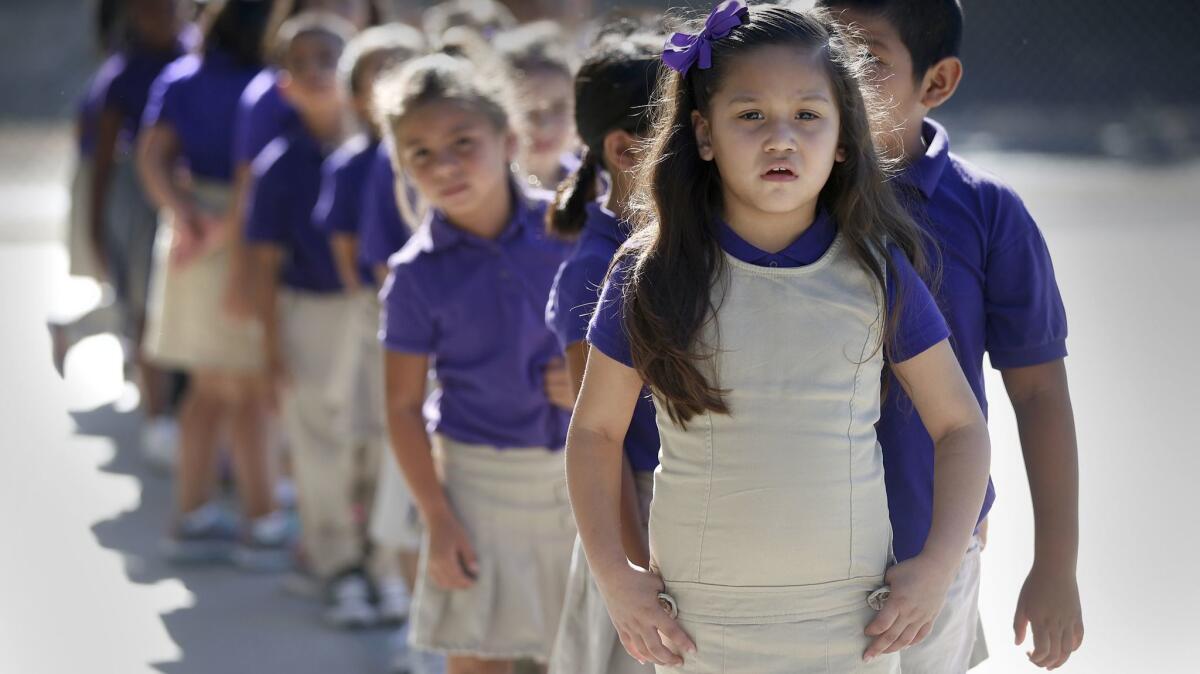
The Tapias felt guilty — and anxious. Would the other children make fun of their girl?
Giuliana seemed happy in her purple school uniform and hair bow. Her classroom was cheerful, with shelves of books and stuffed animals. There were bins filled with plastic dinosaurs, Lego pieces and toys for counting; colorful bulletin boards featured numbers, letters, days of the week and months of the year. Maris, Crystal and Giana seemed like they’d make nice friends.
Giuliana’s teacher, Maryellen Whittingham, was soft and smiley and told the kids to call her Mom or Grandma if they forgot her long name. She read them a book in a singsong voice about a teacher named Miss Bindergarten, taught them a counting rhyme with an alligator puppet and let them get up and wiggle when they got restless.
But when the children sang their ABCs, Giuliana did not join in, even when a classmate said, “Sing!” She played with her hair and wandered away from her spot in the group.
Months later, she said she’d been scared.
***
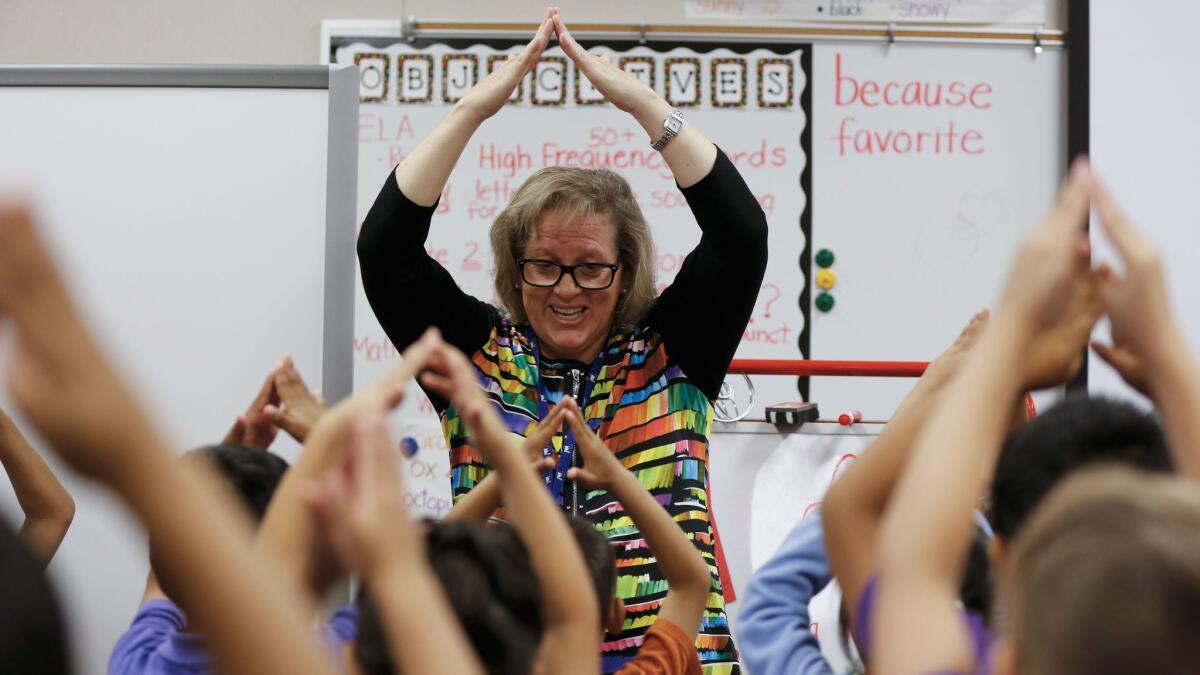
Whittingham is a literacy specialist with more than two decades of experience. She quickly spots children who need extra help.
Giuliana worried her a bit. “Yikes,” she thought, “that’s a blank slate.”
The kindergarten class was about 80% Latino and overwhelmingly low-income, and relatively few parents had gone to college. About half the children were learning English. Giuliana wasn’t the only one behind, but many of her classmates at least knew most of the alphabet.
In the six years since Telesis opened, a top-notch staff had transformed what had been a struggling middle school with declining enrollment into an award-winning K-8 campus. The Rowland Unified School District campus — a member of a national network called called “No Excuses University” — was committed to high expectations, teaching values and college preparation. Staff collaborated and used testing and data to shape teaching.
Telesis could help Giuliana, Whittingham felt, but not on its own.
At her first parent meeting a few months into the school year, she told the Tapias they needed to step up. Giuliana still was lagging behind. She knew only three target words and could not write sentences.
Her parents were ready for drastic action.
“I said I was going to stop going out,” Anna Tapia recalled. “All I’m going to do is sit down and read to her and study high-frequency words.”
“Absolutely not,” Whittingham said. Keep living your life, but also create a richly literate environment.
Put alphabet magnets on the refrigerator. Make word flashcards to read in the car. Write letters and have Giuliana trace them. Point out words on menus: “H in hamburger.” Spell on outings: “z-o-o.” Read every night.
It seemed straightforward, but the new regimen was challenging.
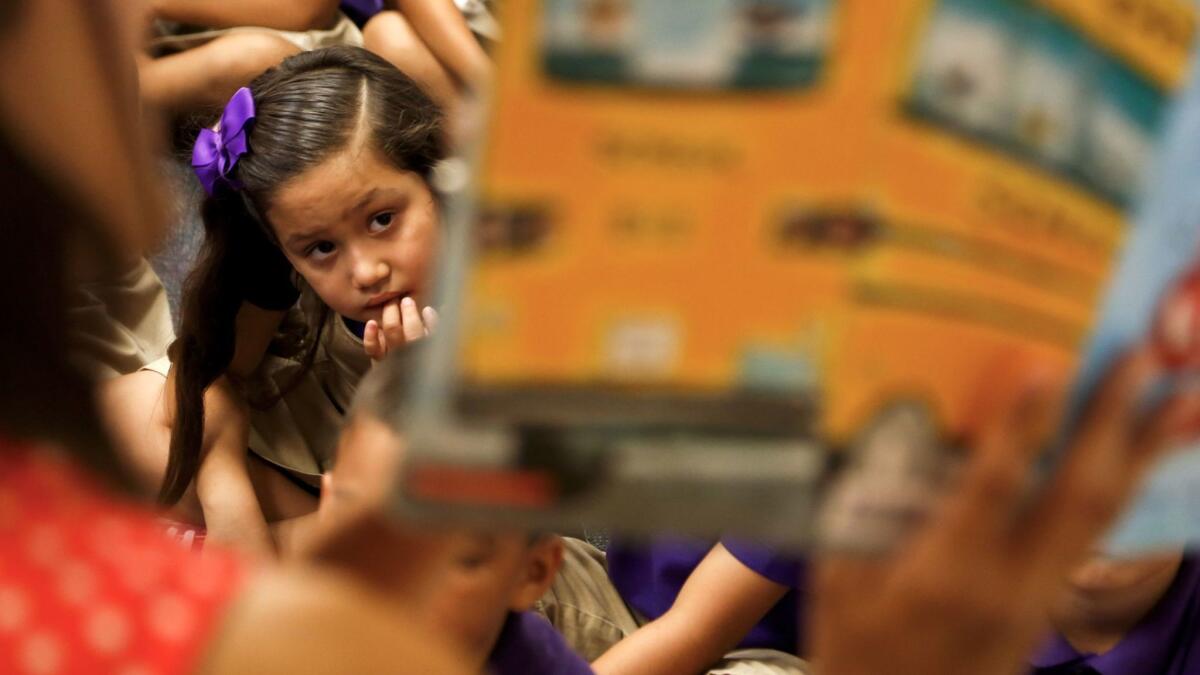
Giuliana got frustrated. She wrote her letters backward. She let her younger brother distract her. She said, bursting into tears, “I can’t do this.”
Sometimes, Arturo Tapia lost patience and began to raise his voice. But not his wife, he says.
Anna quizzed Giuliana everywhere they went — “What is s-t-o-p?” — and made her write down the words when she got home. She insisted her daughter write in a journal every day. She bought her books and school supplies instead of toys.
“I honestly felt it was my fault she was at that level,” Anna said. “So now I had to do my part to help her.”
A breakthrough came in December, when Giuliana came home singing several new songs she had learned for the school’s winter concert. Her mother noticed her ease in remembering the words. At Whittingham’s suggestion, she came up with a song to help Giuliana memorize how to spell her name. It worked beautifully.
Later that month, Giuliana began writing sentences: “I see stocking full of toys.” At the sight of them, her mother cried.
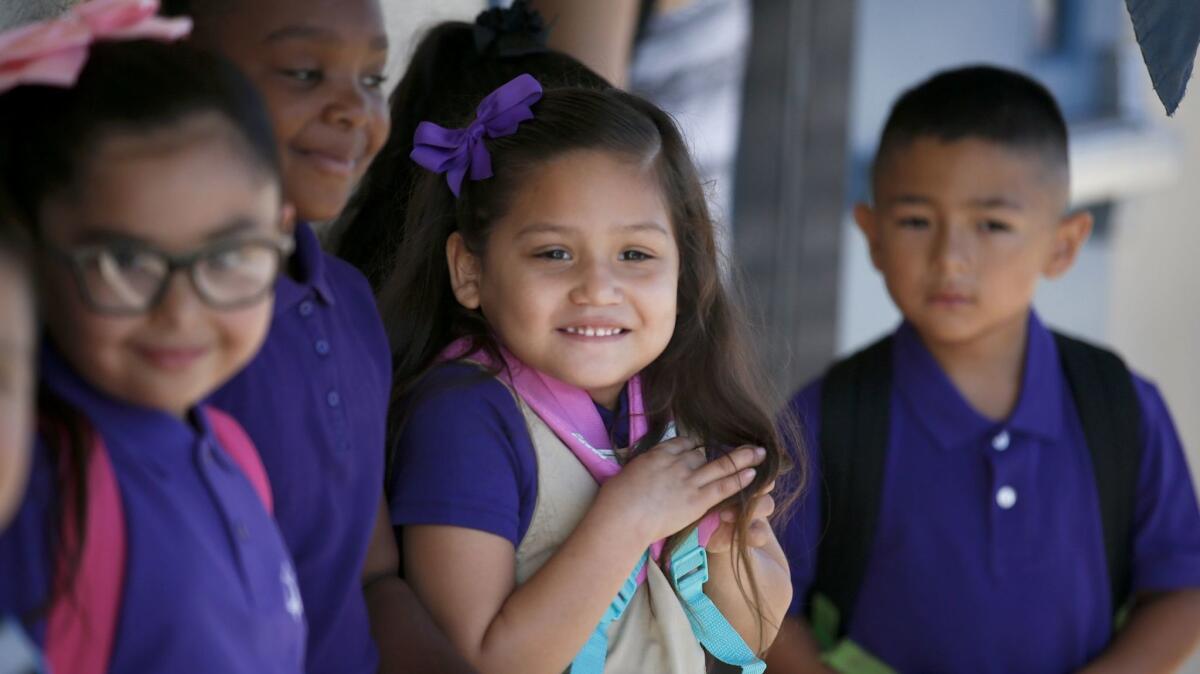
***
In class, Whittingham was teaching kindergartners what used to be first-grade work: three-to-five sentence essays that stay on topic and give details, with correct punctuation and words spelled phonetically.
Two years ago, the school district nearly tripled the number of words it expected them to know from 36 to 100.
The more ambitious learning goals are driven by the Common Core academic standards — adopted by more than 40 states since 2010 — that are supposed to better prepare students for college and careers.
Now when Whittingham reads a book to her kindergartners, she questions them about the cover and title, the author and illustrator, the problem and solution, the setting and characters. During one visit, she read two versions of “The Three Little Pigs” so they could compare and contrast the texts.
“Twenty years ago, we read books just for the joy of reading,” Whittingham said wistfully. “It seems like we’re rushing kids to grow up.”
She works to raise performance but not anxiety. She models everything: using scissors, drawing figures, writing letters, even making mistakes. Once, she deliberately messed up a letter.
“I can cry. I can make a big X. Or I can be proud and keep going,” she told the class. “If you don’t make a mistake, you’re not learning anything new.”
Parents who expect perfection hold their children back, she said, by making them afraid to try new things and so develop skills.
***
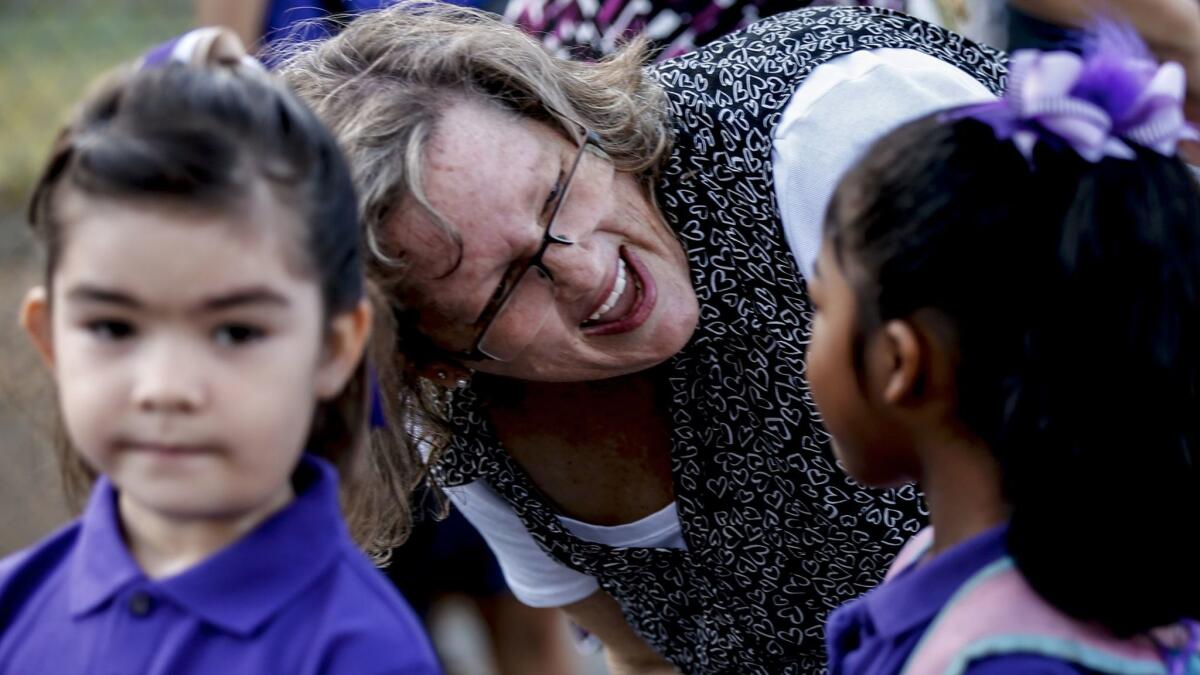
By the end of February, Giuliana had managed to reach grade level, mastering 50 words. Whittingham’s entire class — including those who started as limited English speakers — had moved from the lowest two of four reading levels to the highest, an achievement Telesis Principal Johan Schmitz called “phenomenal.”
By June, 90% had reached English fluency, and every student had reached or exceeded grade level for all other milestones in reading and math.
Whittingham credits their parents’ willingness to take her suggestions to heart and diligently work with their children.
“What makes the biggest difference is parent support and enforcing high expectations,” Whittingham says. “If we have that, we can overcome language barriers and socioeconomic differences.”
That message appears to be spreading. A new Stanford University study found that the stubborn academic gap between white and Latino kindergartners had narrowed between 1998 and 2010. A companion study suggested why: Low-income parents in that time had started reading more to their children, taking them on more enriching outings and getting them books and home computers.
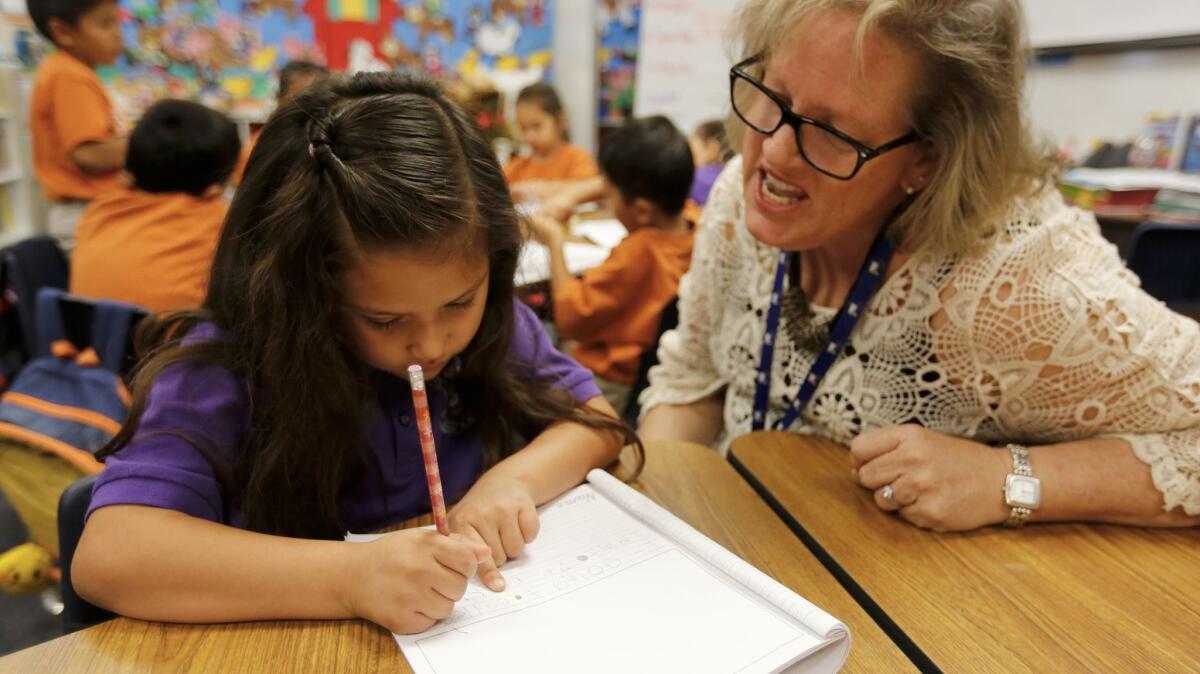
***
By the end of the year, Giuliana had learned to read and write five-sentence essays, count to 100 and draw pictures of people with fully formed features.
On her first day of summer school in June, she sat with Whittingham, arms crossed and brow knit in concentration. Her teacher pointed to a word on a list of 100. Ninety-seven had been marked off. Just three more to go.
“Place,” Giuliana read.
“M…m…ade.”
“Great.”
Whittingham smiled. “You know what that means.”
“I’m in the 100 Club!” Giuliana whooped, as classmates high-fived her.
She couldn’t wait to get home to share the news with her parents — who already are reading daily to her 21-month-old brother, Sebastian, and plan to send him to preschool.
“My mom,” Giuliana said, “is going to flip.”
To read the article in Spanish, click here
ALSO
L.A. Unified creates appeal process for parents who are kept off school campuses
Commercial digital billboard proposed for Hollywood High
More to Read
Sign up for Essential California
The most important California stories and recommendations in your inbox every morning.
You may occasionally receive promotional content from the Los Angeles Times.











